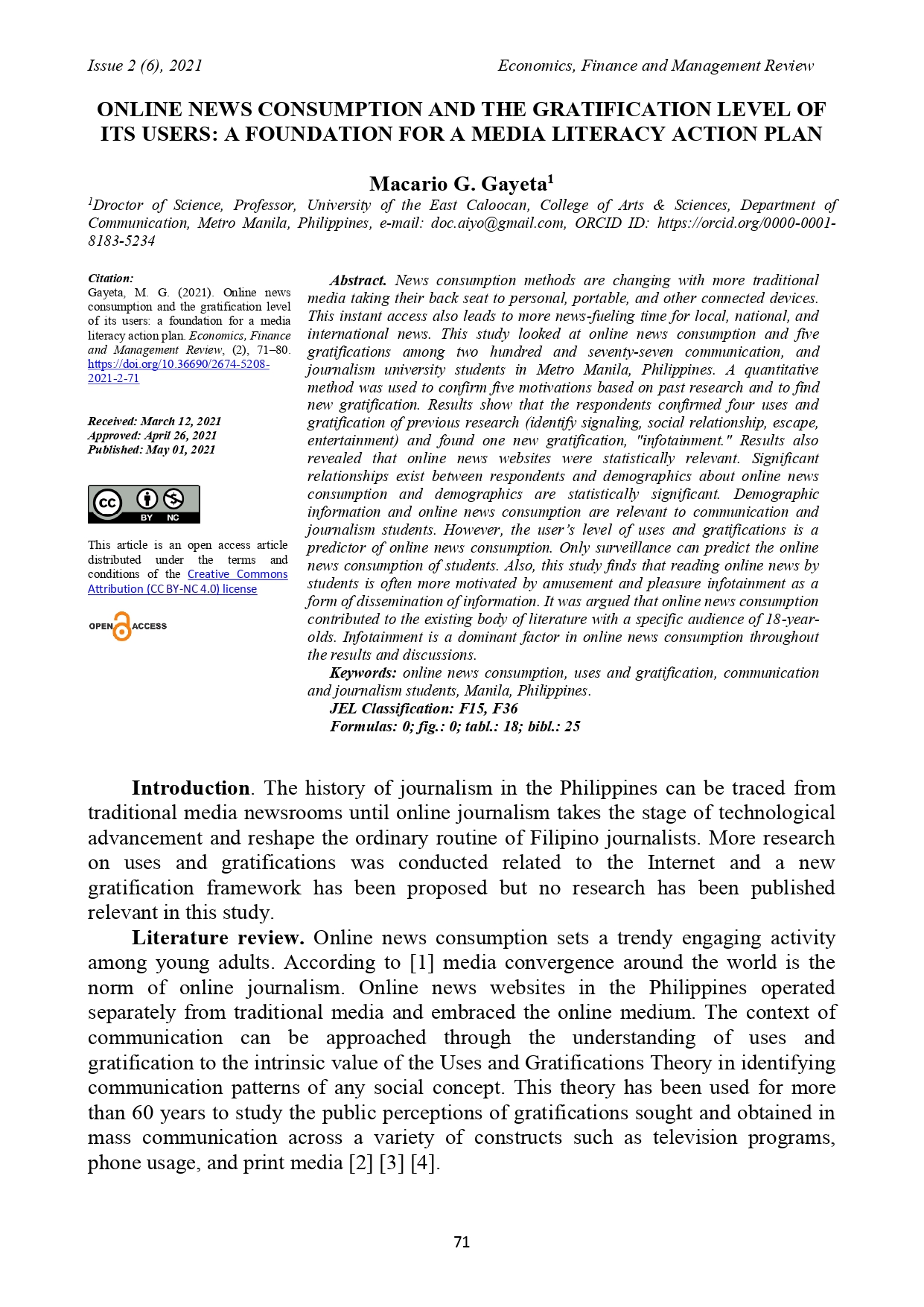ONLINE NEWS CONSUMPTION AND THE GRATIFICATION LEVEL OF ITS USERS: A FOUNDATION FOR A MEDIA LITERACY ACTION PLAN
DOI:
https://doi.org/10.36690/2674-5208-2021-2-71Keywords:
online news consumption, uses and gratification, communication and journalism students, Manila, PhilippinesAbstract
News consumption methods are changing with more traditional media taking their back seat to personal, portable, and other connected devices. This instant access also leads to more news-fueling time for local, national, and international news. This study looked at online news consumption and five gratifications among two hundred and seventy-seven communication, and journalism university students in Metro Manila, Philippines. A quantitative method was used to confirm five motivations based on past research and to find new gratification. Results show that the respondents confirmed four uses and gratification of previous research (identify signaling, social relationship, escape, entertainment) and found one new gratification, "infotainment." Results also revealed that online news websites were statistically relevant. Significant relationships exist between respondents and demographics about online news consumption and demographics are statistically significant. Demographic information and online news consumption are relevant to communication and journalism students. However, the user’s level of uses and gratifications is a predictor of online news consumption. Only surveillance can predict the online news consumption of students. Also, this study finds that reading online news by students is often more motivated by amusement and pleasure infotainment as a form of dissemination of information. It was argued that online news consumption contributed to the existing body of literature with a specific audience of 18-year-olds. Infotainment is a dominant factor in online news consumption throughout the results and discussions.
Downloads
References
Tandoc, Jr. E.C. (2014). Breaking news or breaking the newspaper? Print journalists, online journalists, and their medium-based loyalties. Plaridel, 11(1), 15-34.
Saleeman, I. G., Budiman, A. M. & Ahmad, . M. (2015). Uses and gratifications of news among ethnic groups in Nigeria. Mediterranean Journal of Social Sciences, 6(3), 178-186.
Thapa, B. (2002). Information needs and search behaviors: a comparative study of ethnic groups in the Angeles and San Bernardino national forests. California Leisure Sciences, 24, 89-107
Rubin, A.M. & Rubin, R. C. (1995). The interface of personal and mediated communication: A research agenda. Critical Studies in Mass Communication, 2(1), 36-53 in Ancu, M. & Cozma, R. (2009). My space politics: Uses and gratifications of befriending candidates. Journal of Broadcasting & Electronic Media.
Chapman, J. L. & Nuttall, N. (2011). Journalism today: A themed history. Wiley-Blackwell
Majumder, D. & Hasan, M. (2013). Newspaper reading habits of private university students: A case study of the World University of Bangladesh. Journal of Business and Management, 12(1), 87-91. e-ISSN: 22789; P-ISSN: 2319-7668.
Kabir, S. (31 January 2011). A habit of reading newspapers. Retrieved on August 30, 2014, from
Newman, N., Fletcher, R., Levy, D. & Klies, R. (2016). Reuters Institute Digital News Report 2016. Reuters Institute for the Study of Journalism. Retrieved from
Nguyen, A., Ferrier, E., Western, M. & Mcky, S. (2005). Online news in Australia: Patterns of use and gratification. Australian Studies in Journalism, (15), 5-34.
Kumar, D., Singh, R. & Siddiqui, J. A. (2011). Newspaper reading habits of university students: A case study of Chaudhary Charan Singh University, India. Library Philosophy and Practice.
Philippine News Readership. (2013, August 31). Newspaper readership in the Philippines. Retrieved from
Maslog, C. C. & Dela Pena-Contreras, M. (2006). Philippine online journalism: Promise and perils. Asian Media Information and Communication Centre (AMIC). Retrieved from
Tuazon, R. R. (2011). The print media: A tradition of freedom. Retrieved from
Courrtois, C., Merchant, P., De Marez, L. & Verleye, G. (2009). Gratifications and seeding behavior of online adolescents. Journal of Computer-Mediated Communication, 15(1), 109-137. DOI
Alsridi, H. (2018). Uses and gratifications of online news among young adults in Bahrain. Athens Journal of Mass Media and Communications, 4(1), 63-79.
Tewari, P. (2015). The habits of online newspaper readers in India. Journal of Socialomics, 4(2), 1-5.
Meeds, R. (2015). Changing roles of traditional and online media as trusted news sources in Qatar and their relationships with perceived important issues and interest in politics. Journal of Middle East Media, 11, 34-61.
Svennevig, M. (2000). Needs, not nerds: Researching technological change. International Journal of Advertising, 19.
Korgaonkar, K. P. & Wolin, L. D. (1999). A multivariate analysis of web usage. Journal of Advertising, 53-68.
Duo, W., Wang, G. & Zhou, N. (2006). Generational and regional differences in media consumption patterns of Chinese generations X customers. Journal of Advertising, 35(2), 101-110.
Flavian, C. & Gurrea, R. (2006). The choice of digital newspapers: Influence of reader goals and user experience. Internet Research, 16(3), 231-247.
Wok, S. S., Taman, E., Bolong, J. & Ahmad, A. M. (2011). A pattern of news media communication and news dimension among youth: A test of agenda-setting theory. Global Media Journal, 1(1), 1-31.
Lancaster, K., Hughes, C. E. & Spicer, B. (2012). News media consumption among young Australians pattern of use and attitudes toward media reporting. Peer-Reviewed Journal, 143, 16-27.
Phinney, J. (2012). Millenial assessment of credibility among news sources. Unpublished master's thesis. Angelo State University.
Brian, C. (2014). Writing and editing for digital media. London: Routledge.

Downloads
Published
How to Cite
Issue
Section
License

This work is licensed under a Creative Commons Attribution-NonCommercial 4.0 International License.








